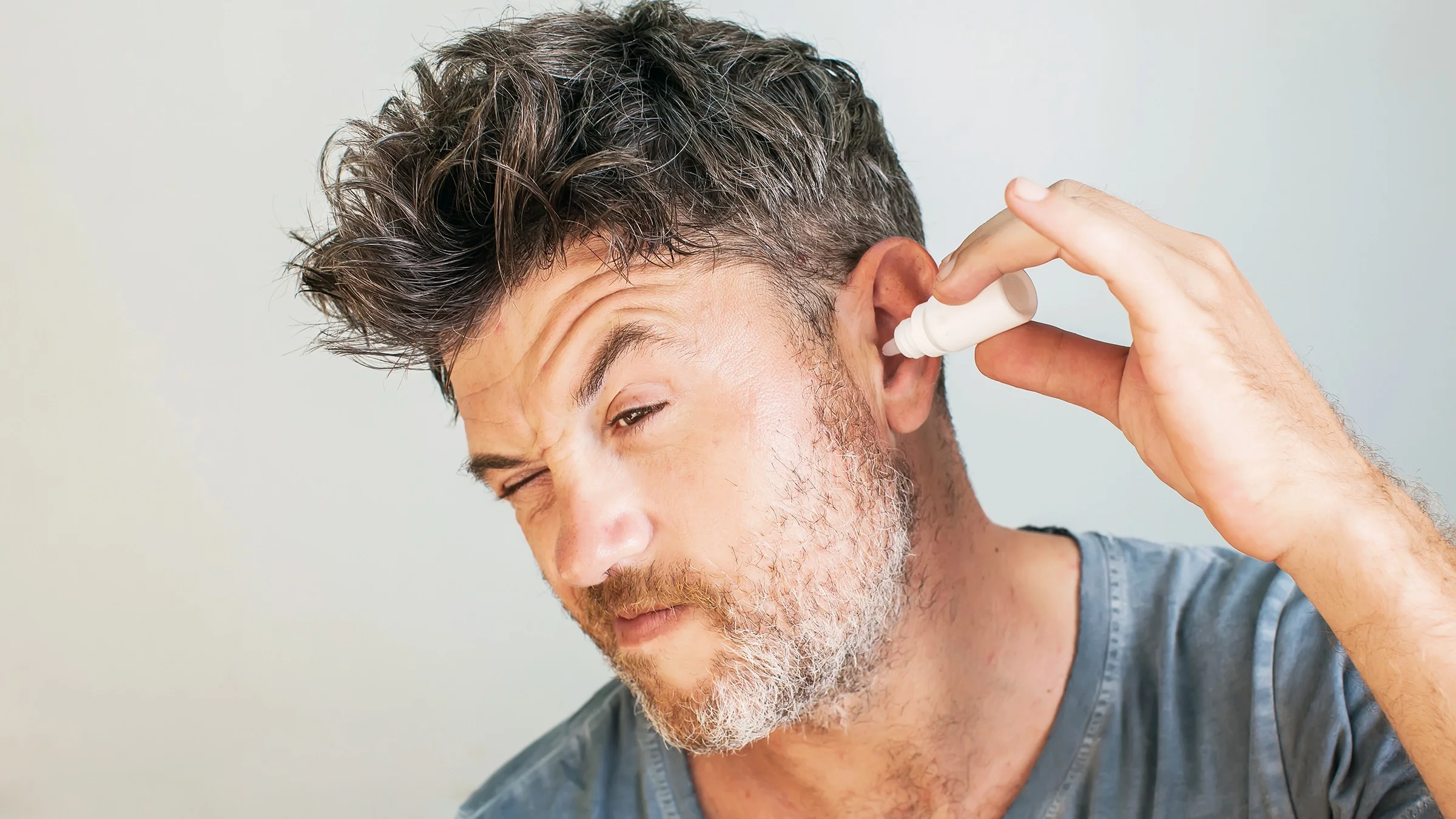Key takeaways:
Swimmer’s ear (otitis externa) is an outer ear infection that can develop when water gets trapped in the ear canal.
Home remedies can reduce the risk of developing swimmer’s ear and help relieve symptoms of an outer ear infection.
Most people need treatment with antibiotic or steroid ear drops to cure swimmer’s ear.
You don’t necessarily have to swim to get swimmer’s ear, an infection of the outer ear. Whether it’s spending time outdoors in humid weather, bathing, or running through the backyard sprinkler, it’s easy to get water in your ear.
Water that gets trapped in the ear canal is a great place for bacteria or fungi to grow. When that happens, it can lead to swimmer’s ear, an outer ear infection (otitis externa).

Most people need treatment with prescription ear drops, like antibiotic or steroid ear drops, to cure their swimmer’s ear.
But there are home remedies for swimmer’s ear that can help ease symptoms while you wait for prescription medications to start working. Some home remedies can even lower your risk for developing otitis externa in the future.
Here are some effective swimmer’s ear treatments and can help you get rid of the discomfort.
1. Medications
Prescription medications are a common and effective swimmer’s ear treatment. They’re usually in the form of ear drops. A healthcare professional will prescribe the best medication for you based on whether your eardrum is involved and if you’re at high risk for complications.
Prescription ear drops for swimmer’s ear often include antiseptics, antibiotics, steroids, or a combination of these. Common swimmer’s ear drops are:
Hydrocortisone / acetic acid (Acetasol HC) ear drops
Neomycin / polymyxin B / hydrocortisone ear drops
Ciprofloxacin / dexamethasone ear drops
Ciprofloxacin ear drops
Ofloxacin ear drops
If you have a serious infection or fever, you may also receive oral antibiotics like:
Amoxicillin / clavulanate (Augmentin)
Can adults get ear infections? Yes! Kids are more likely to get ear infections, but some adults can get them too.
What’s the best treatment for an ear infection? It depends on what type of ear infection you have. Here’s our expert guide to ear infection treatments.
Not sure if you have swimmer’s ear? Here’s how to tell if you have otitis externa.
2. Keep your ears dry
Keeping your ears dry is part of good general ear health. And it can help prevent swimmer’s ear.
If you spend a lot of time at the beach or pool, consider using a bathing cap or well-fitting ear plugs to prevent water from getting in the ear. Or you can apply Vaseline to a cotton ball and place it over the ear while bathing.
Once you’re out of the water, try these tips to help prevent swimmer’s ear:
Gently tilt your head to the side to help water drain out of the ear canal.
Pat your ears dry.
You can also use a hair dryer on the lowest setting to dry out your ear.
Read more like this
Explore these related articles, suggested for readers like you.
When you have otitis externa, keeping your ears dry can help lower the risk of more bacteria and fungi growing in your ear canal. This can help your infection from getting worse.
Keeping your ears dry can also make you more comfortable. Drainage from swimmer’s ear can be irritating and itchy. Keeping your ears dry can help relieve some of these symptoms.
3. Drying ear drops
It may seem counter-intuitive, but using ear drops can help clear and dry out the ear canal.
You can make ear drops to prevent swimmer’s ear at home by mixing equal amounts of rubbing alcohol and distilled white vinegar. After swimming, put a few drops in each ear. This combination helps dry out the ear canal and prevent the growth of bacteria.
One quick note: Don’t use homemade ear drops if you have ear tubes or a hole in your eardrum without first talking with an ear, nose, and throat (ENT) specialist or a healthcare professional. Homemade rinses can increase the risk of serious infection in people with a hole in their eardrum.
Homemade ear rinses can sometimes help relieve symptoms of swimmer’s ear. But many people also develop skin breakdown inside the ear canal when they have swimmer’s ear. Alcohol, vinegar, and other rinses may cause further irritation.
It’s best to talk with a healthcare professional before using a homemade rinse when you have swimmer’s ear.
4. Apply heat
Gentle heat around the ear can help relieve swelling and pain from swimmer’s ear. Try applying a heating pad or a warm compress around the ear for 10 to 15 minutes at a time. Keep the heating pad on low and wrap it in a towel to avoid burns.
5. Try OTC pain relievers
Pain relievers like acetaminophen (Tylenol) or ibuprofen (Motrin) can reduce inflammation and pain from swimmer’s ear. They’re available over the counter (OTC). Here’s what to know about them:
Acetaminophen generally starts working in 45 minutes. You can take it every 4 to 6 hours.
Ibuprofen starts working within 30 minutes. You can take it every 6 to 8 hours.
Make sure to follow the dosing instructions closely, especially for children.
6. Take a break from swimming
If you have signs of swimmer’s ear like pain, itching, or redness around the ear, it’s best to avoid swimming for a while. This can help you avoid getting a new infection while your old one is still trying to clear up.
Most experts recommend about a week out of the water for people diagnosed with swimmer’s ear. You may be able to keep swimming even with an infection. But it’s important to take steps to avoid getting more water in your ears (see the first remedy, above).
Your primary care provider or ENT specialist can help you figure out whether it’s safe to go back in the water with active otitis externa.
Are there home remedies you shouldn’t use for swimmer’s ear?
Yes, some home remedies for otitis externa can make your symptoms worse. Here are home remedies to avoid when you have swimmer’s ear symptoms.
Garlic oil
Garlic has some antibacterial properties. However, studies show that garlic doesn’t work well to treat swimmer’s ear. In addition, garlic oil can cause skin irritation or burns inside the ear canal.
Hydrogen peroxide
Excess ear wax can sometimes make you more prone to swimmer’s ear. That’s because wax can trap bacteria and water in the ear canal.
You can use OTC products like Debrox. Or you can use a home mixture of equal parts hydrogen peroxide and water to soften and remove wax. This may help to prevent swimmer’s ear.
However, you should never use these drops if you have symptoms of swimmer’s ear. They can cause more damage to the ear canal. These drops should also not be used if you have ear tubes or a hole in the eardrum.
Ear candles
Ear candles are a home remedy that some people use to remove wax and debris from the ear canal. However, ear candles can cause serious burn injuries and aren’t recommended for treating swimmer’s ear.
Q-tips
Resist the urge to put Q-tips (or any other objects) into the ear to try to clean it out. This can damage the ear canal and increase your risk for infection.
Essential oils
Various essential oils have been reported to help treat ear infections. One small study looking at a combination of three essential oils found that they worked as well as ciprofloxacin antibiotic ear drops to treat otitis externa. However, the study was small. And essential oils can cause allergic reactions or damage the eardrum. That’s why experts don’t recommend essential oils for treating swimmer’s ear.
When should you seek medical care for swimmer’s ear?
If you have symptoms of swimmer’s ear, it’s best to reach out to a healthcare professional for help. You’ll want to seek care if you have:
Itching in the ear
A sense of fullness or your ears feeling plugged
Pain when pulling on the ear lobe, chewing, or touching the ear
Discharge coming out of the ear
Swelling and redness of the ear or behind the ear
Extension of the ear away from the side of the head
Fever
Most cases of swimmer’s ear get better quickly with antibiotic or steroid ear drops. Rarely, though, swimmer’s ear can lead to a more severe infection, such as cellulitis or malignant otitis externa. Checking in with a healthcare professional can help you avoid more serious complications.
Frequently asked questions
Swimmer’s ear symptoms can sometimes last for weeks without treatment. In some cases, swimmer’s ear can go away on its own. But if bacteria is causing your swimmer’s ear, you’ll likely need medication to get rid of the infection. If your symptoms are worsening or don’t improve within a few days, it’s best to see a healthcare professional to prevent complications.
Swimmer’s ear usually responds well to treatment, and you should see an improvement within 48 hours. Sometimes, there can be heavy debris in the ear that needs to be removed before the medication can be effective. So let your prescriber know if your swimmer’s ear hasn’t gotten any better with treatment.
Swimmer’s ear symptoms can sometimes last for weeks without treatment. In some cases, swimmer’s ear can go away on its own. But if bacteria is causing your swimmer’s ear, you’ll likely need medication to get rid of the infection. If your symptoms are worsening or don’t improve within a few days, it’s best to see a healthcare professional to prevent complications.
Swimmer’s ear usually responds well to treatment, and you should see an improvement within 48 hours. Sometimes, there can be heavy debris in the ear that needs to be removed before the medication can be effective. So let your prescriber know if your swimmer’s ear hasn’t gotten any better with treatment.
The bottom line
Home remedies can help prevent swimmer’s ear by keeping the ear canal clear and dry. If you start to develop symptoms of an infection, you can use gentle heat and OTC pain relievers to help manage symptoms. But it’s best to have a medical professional examine your ear if you think you may have an ear infection. They can get you started on antibiotic or steroid ear drops to help you feel better faster and prevent more serious complications.

Why trust our experts?


References
American Academy of Otolaryngology–Head and Neck Surgery Foundation. (n.d.). Plain language summary: Acute otitis externa (swimmer’s ear).
Centers for Disease Control and Prevention. (2025). Preventing swimmer’s ear.
ENT Health. (n.d.). Are ear candles a safe option for removing earwax? American Academy of Otolaryngology–Head and Neck Surgery Foundation.
HealthyChildren.org. (2025). Swimmer’s ear in children. American Academy of Pediatrics.
Medina-Blasini, Y., et al. (2023). Otitis externa. StatPearls.
Nationwide Children’s. (2019). Otitis externa (swimmer’s ear).
Nemours KidsHealth. (2024). Ear tube surgery.
Panahi, Y., et al. (2012). Investigation of the effectiveness of Syzygium aromaticum, Lavandula angustifolia and Geranium robertianum essential oils in the treatment of acute external otitis: A comparative trial with ciprofloxacin. Journal of Microbiology, Immunology and Infection.
Prasad, S. C., et al. (2014). Osteomyelitis of the temporal bone: Terminology, Diagnosis, and management. Journal of Neurological Surgery.
Schaefer, P., et al. (2012). Acute otitis externa: An update. American Family Physician.
Uzun, L., et al. (2019). Antimicrobial activity of garlic derivatives on common causative microorganisms of the external ear canal and chronic middle ear infections. Turkish Archives of Otorhinolaryngology.


















